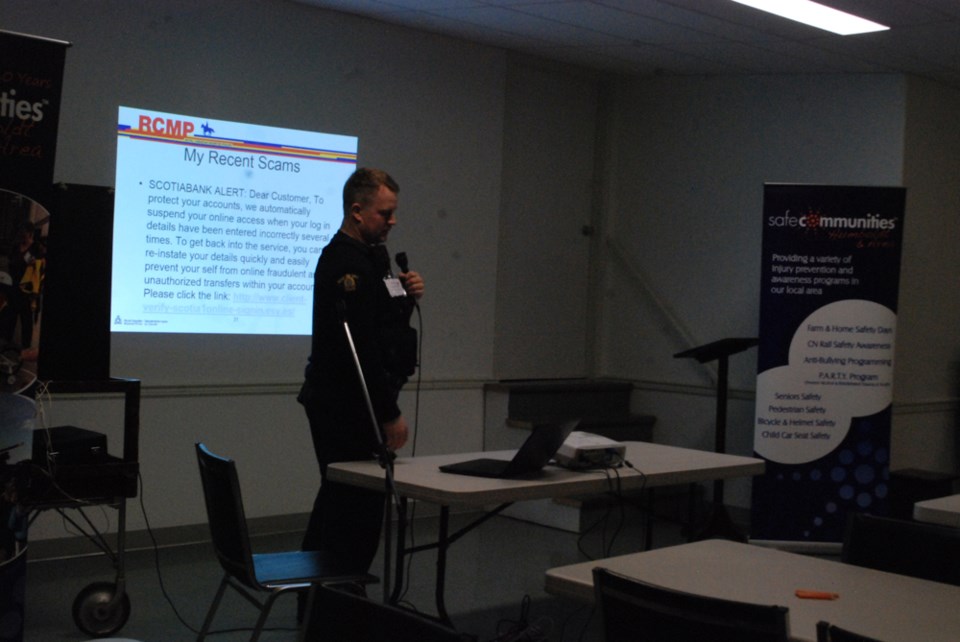Seniors across the region have been getting some vital information thanks to the Safe Communities Senior Strong: Senior Safety Symposium events.
The symposium is making its way to Caleb Village on Nov. 23 with seven workshops ranging from fall prevention with Daphne Kemp, Regional Fall Reduction and Injury Prevention Coordinator with the Saskatoon Health Region, to senior abuse with Sandy English with Partners Family Services, and fraud prevention with Cst. Nadia Soulliere with the Humboldt RCMP.
Shari Hinz with Safe Communities says all their topics in Humboldt, as well as three other symposiums in Middle Lake, Watson, and Bruno, are those of concern for local seniors and caregivers.
“It’s senior led in terms of the topics being highlighted at each of the sessions. It’s what’s of interest in the perspective communities who are hosting.”
While the events are happening within fall prevention month, Hinz says that that is just one aspect they wanted to highlight during the day long workshop.
“Falls affect everyone, not just seniors, but definitely bringing to light some of those other areas of general safety that you don’t necessarily receive a lot of information on but are equally important.”
The 55+ Mature Driver Program is a Canada Safety Council free program to talk to seniors about safe driving with Ron MacKay, program coordinator for Saskatoon and District, presenting on the program.
MacKay says that things slow down as we age but it is up to the senior to be honest about where they are when it comes to driving safely.
“There is a lot of self-reflection in the program to help recognize when it is time to hang up those keys for good.”
Seniors have more accidents per kilometre of driving than any other age group while also driving less kilometres than any other age group, says MacKay.
Refreshing the rules of the road is also part of the mature driver course with many seniors driving for decades without any correction on the rules of the road.
The most common mistakes made by senior drivers that results in collisions is improper right of way and improper left turns, which make up 60 per cent of collisions among seniors.
Left turns can be deadly, says MacKay.
“You have to have the vision to know how far that oncoming car is away from you. Is it too close to make the turn or far enough to safely make the turn?”
Being honest about losing driving skills is the first step to knowing their limitations, says MacKay.
Having that conversation with their family and their doctor before SGI does can ensure that the driver does not lose their license right away. Knowing your restrictions for safe driving, like how long they can comfortably drive and whether they can drive at night, means that they can keep driving for a time, he says, but as soon as SGI gets involved, it can mean no more driving.
Another presentation that was of some interest to seniors was about fraud prevention.
When Cst. Peter Chandler presented to seniors at the Bruno symposium on Nov. 17, the main message he wanted to get across was simply not to give their information out to anyone.
“No matter how bad they make you feel about it, they can really pull your heartstrings or your conscious... (and) some people are too nice to say no.”
You cannot do that anymore, says Chandler.
Hinz says seniors are often seen as easy targets with many different scammers trying to get them to give their money up, like grandparents scams or even scams that target everyone, like CRA scams.
“Giving seniors that information, because a lot of the time they’re living on their own or if they’re being targetted and utilizing family members as a way to get funds from. What better way to try to trick a senior.”
While some of the topics are taboo, they are conversations that seniors need to have with their doctors or family members, says Hinz.
“Whether it’s financial abuse or what not, it can be people very close to them that solicit that. Giving them that information, tools, and resources to put an end to it or reach out for assistance is important.
Hinz is grateful for the presenters who volunteered their time to the symposium, which was done in partnership with the Health Region, Partners Family Services, RCMP, Pharmasave Humboldt and Watson, Bruno Pharmacy, Saskatoon and District Safety Council, Humboldt and District Ambulance Service, Quill Plains Ambulance Care, and Bruno First Responders.
Funding partially provided by the Government of Canada’s New Horizons for Seniors program.
Call Shari Hinz at Safe Communities for more information.



